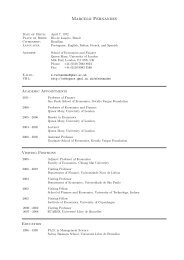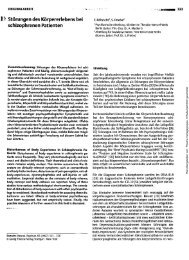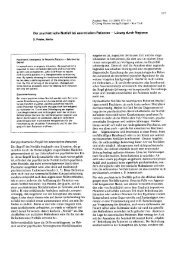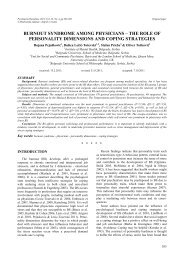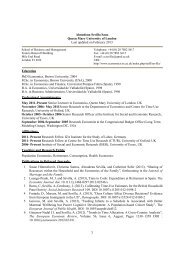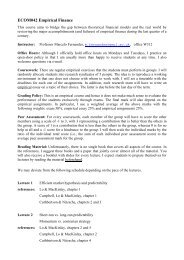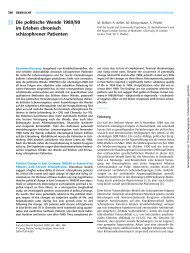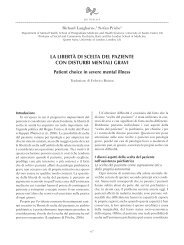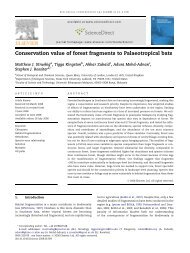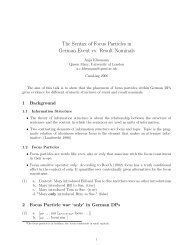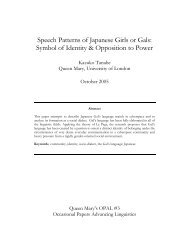Proofs - Personal Webspace for QMUL - Queen Mary, University of ...
Proofs - Personal Webspace for QMUL - Queen Mary, University of ...
Proofs - Personal Webspace for QMUL - Queen Mary, University of ...
You also want an ePaper? Increase the reach of your titles
YUMPU automatically turns print PDFs into web optimized ePapers that Google loves.
S78 I. Missmahl et al. / European Psychiatry 27 (2012) / supplement n°2 / S76-S80<br />
the manuals were approved by the Ministry <strong>of</strong> Public Health and<br />
are now obligatory <strong>for</strong> all psychosocial counsellors who want to<br />
work in the Health system.<br />
This curriculum and training methodology differs from<br />
the WHO mental health Gap Action Programme (mhGAP).<br />
Intervention Guide in so far as it is not so much orientated<br />
on a diagnosis based on DSM IV or ICD10 and the associated<br />
case management but rather puts the main emphasis on the<br />
understanding <strong>of</strong> the symptom in a given cultural context.<br />
Specifi c attention is given to the question how far standard<br />
diagnostic tools developed in a Western cultural setting can<br />
assess culturally signifi cant indicators in the local context.<br />
Starting point <strong>of</strong> the therapy is the most pressing problem <strong>of</strong><br />
the patient, which is usually connected to those <strong>for</strong>ms <strong>of</strong> social<br />
distress that contribute most strongly to social isolation and<br />
functional impairment. Already after the fi rst session the patient<br />
should feel that he or she will be able to regain some infl uence on<br />
their life situation. Subsequent psychotherapeutic interventions<br />
are then resource- orientated and based on a problem solving<br />
approach focusing on the main problem <strong>of</strong> the client; they apply<br />
basic elements <strong>of</strong> standard therapeutic techniques including the<br />
salutogenetic approach <strong>of</strong> Antonovsky [3].<br />
In 2011, more PSCs have been trained <strong>for</strong> the Northern<br />
Provinces and after their one year examination, the best ones<br />
with the background <strong>of</strong> medical doctors will receive a skillbased<br />
training in methodology and teaching skills and will become<br />
National Trainers <strong>for</strong> Psychosocial Counselling. In 2012, this<br />
program will be rolled out in all provinces <strong>of</strong> Afghanistan and<br />
by 2014, there will be National Mental Health Trainers in all<br />
Provinces who are able to train further PSCs <strong>for</strong> all CHCs. Careful<br />
training can thus assure that counsellors proceed in a way that<br />
is both culturally sensitive [1] as well as individually focused<br />
on the needs <strong>of</strong> their clients. Moreover, psychosocial counsellors<br />
– like medical personal in general – need to acquire basic<br />
psychiatric knowledge. However, most manuals available <strong>for</strong><br />
psychiatric care are too complex and it cannot be expected that<br />
psychosocial counsellors are really able to correctly diagnose<br />
psychiatric illness according to ICD- 10 or DSM- 4 [16,2].<br />
4. Learning a Basic Medical Approach to Psychopathology<br />
An alternative approach to identifying psychopathology<br />
is based on university experience in the training <strong>of</strong> medical<br />
students around the world. This training also does not focus on<br />
clear identifi cation <strong>of</strong> single disorders in ever more complex classifi<br />
cation systems. Rather, medical student education focuses on<br />
distinguishing between six types <strong>of</strong> psychiatric disorders: Acute<br />
and chronic exogenous psychoses (e. g. delirium and dementia<br />
as examples <strong>of</strong> cognitive disorders with a “brain organic”<br />
background and the associated syndromes <strong>of</strong> drug dependence),<br />
endogenous psychotic disorders and major affective disorders<br />
(such as schizophrenia and bipolar as well as severe unipolar<br />
disorder), psycho reactive / adjustment disorders (<strong>for</strong>mally<br />
classifi ed as neuroses) and personality disorders (Fig.1).<br />
Being able to classify mental disorders at least with respect<br />
to these broad categories helps to decide whether somatic diagnoses<br />
is urgently required, whether certain kinds <strong>of</strong> medications<br />
can help and how urgent psychotherapeutic and psychosocial<br />
Exogenous psychoses<br />
Delirium Schizophrenic Psychoses Neuroses<br />
Dementia<br />
Bipolar Disorders <strong>Personal</strong>ity Disorders<br />
counselling may be. Furthermore, a few core symptoms can<br />
help to systematically distinguish the most pressing acute brain<br />
disorders (with potentially lethal outcome within a few hours,<br />
e. g. acute deliria) from chronic neurodegenerative disorders and<br />
from psychoses and severe affective disorders (Fig. 2).<br />
We are aware that such broad classifi cations and a limited list<br />
<strong>of</strong> symptoms are presenting an extreme reduction <strong>of</strong> psychiatric<br />
complexity, however, in our own experience, knowledge <strong>of</strong><br />
such basic symptoms and categories can greatly help medical<br />
students, non- psychiatric medical personal and psychosocial<br />
counsellors to understand when and how urgently a psychiatric<br />
specialist should be contacted. Furthermore distinguishing<br />
between these basic categories can help to limit medication to<br />
many patient groups and prevent e.g. use <strong>of</strong> neuroleptics outside<br />
<strong>of</strong> “endogenous psychoses” and, more specifi cally, patients from<br />
being wrongly classifi ed as suffering from schizophrenia.<br />
5. Training <strong>of</strong> psychiatric specialists<br />
Our experience in Kabul revealed that even doctors trained<br />
in internal medicine and specializing on mental disorders within<br />
mental health hospital require training in basic neurological<br />
examination skills. Clinical examination, a mainstay <strong>of</strong> neurological<br />
diagnosis until recently, when brain imaging became<br />
available is a must in countries with limited medical resources<br />
such as Afghanistan. Of extreme importance is also the distinction<br />
between epilepsy and dissociative states. There<strong>for</strong>e, the<br />
relatively cheap and repeatedly usable EEG is a highly relevant<br />
diagnostic tool in such settings, and doctors require training<br />
to use this instrument: However, when we taught in Kabul<br />
in 2009 and 2010, no EEG was available in any public mental<br />
health institution. Finally, in our experience, medical training in<br />
a mental health hospital involved rather pr<strong>of</strong>ound knowledge<br />
<strong>of</strong> DSM- 4 symptoms and syndromes, however, there was a<br />
certain lack <strong>of</strong> practical training e. g. in applying such criteria to<br />
individual patients and to discuss diagnostic and differentialdiagnostic<br />
considerations. Moreover, discussion <strong>of</strong> adequate<br />
dosage <strong>of</strong> pharmaceutical medications, particularly neuroleptics,<br />
is strongly required and - at least in our experience – greatly<br />
supported by basic knowledge <strong>of</strong> e.g. required neuroleptic doses<br />
to reach therapeutic levels <strong>of</strong> dopamine- D2- receptor blockade.<br />
The rather low dose <strong>of</strong> haloperidol (below 5 mg) required to<br />
assess such therapeutic receptor blockade was generally not<br />
known to psychiatric practitioners, who tended to dose much<br />
higher even in never medicated subjects [6].<br />
Since there is no hope to have psychiatric specialists in<br />
the immediate future in smaller or larger regional hospitals,<br />
interested practitioners <strong>of</strong> internal medicine or other related disciplines<br />
require training in basic medication skills with respect<br />
to antidepressant, neuroleptic and sedative medication and<br />
<strong>Pro<strong>of</strong>s</strong><br />
Endogenous psychoses Variations<br />
Fig. 1. Pragmatic grouping <strong>of</strong> disease entities in psychiatry and psychotherapy.<br />
13_Heinz.indd S78 14/06/2012 14:45:44



